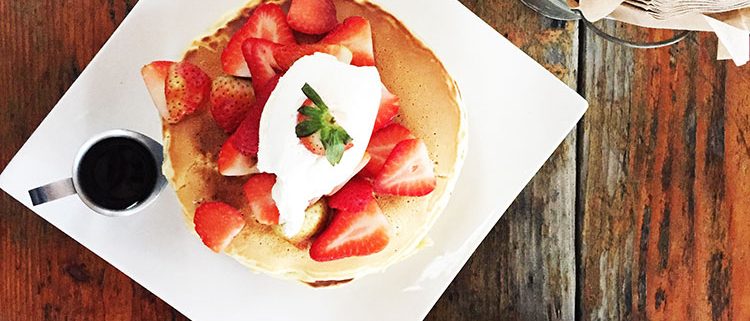REVIEW: JiST Cafe fuses Japanese traditions with Western cuisine
Tucked in a corner of Little Tokyo, JiST Cafe may be small in size, but it’s bustling with character and flavor.
Located on Judge John Aiso Street at the border of the Tokyo Historical District and the Civic Center, the cafe’s location reflects the intersectionality of Japanese and American culture. Surrounded by the Japanese American National Museum and other restaurants, JiST Cafe is immersed in the same history that shaped it.
Tokyo Cafe, JiST’s forerunner, was opened in 1940 by co-founder Glen Ishii’s grandmother. Almost immediately after opening the cafe, she was sent to a Japanese internment camp, a reality that many people in the community faced during the period.
“When [Ishii’s grandmother] came back, she still had this hunger for the American Dream, so she reopened Tokyo Cafe,” co-founder Caroline Shin said.
Tokyo Cafe then became an icon of Little Tokyo, a community staple for families in the area. The cafe was passed on from Ishii’s grandmother to his father to his uncle. Eventually, it was Ishii’s turn.
Ishii and Shin both have years of culinary experience, having worked at L.A. restaurants, Ishii was the executive chef at the Noe Restaurant, where he and Shin met. Shin was also the co-founder of the wildly popular Kogi Korean Barbecue truck and taqueria. When the opportunity to take over Tokyo Cafe fell into Ishii’s hands, it felt like natural next steps for both chefs.
Ishii grew up in Little Tokyo, soaking up the culinary and cultural traditions deeply rooted in the historic neighborhood.
“Little Tokyo has changed a lot over the generations and the years, and it’s really interesting walking down the streets with Chef Glenn, who grew up here, hearing about the people and community,” Shin said. “Knowing the history and keeping this tradition of what was passed down to him is important for this restaurant.”
The menu reflects the intersection of Japanese and American that Ishii and Little Tokyo both represent. Dishes like the porky omurice and the katsu sandwich place an Asian twist on American food. A wide array of delicious pancakes appease the tastebuds of those who hunt for traditional brunch dishes.
The highlight of the menu is the chashu hash skillet, a sweet pork belly and potato hash cooked with a tangy marinade, topped with two hard-boiled eggs. With every bite, the sweet and salty flavor of the sauce erupts. The pork, braised and marinated perfectly, complemented the sauce and potatoes. The eggs, cooked over-easy, run into the mix of ingredients. The different textures, perfectly cooked in “family history,” as the menu describes, create a dish nothing less than divine.
“The most popular dish on the menu for Tokyo Cafe was the chashu shu mai that everybody came in for. It’s really fun seeing 80- year-old people coming in asking for it — people who grew up eating it,” Shin said. “I wanted to save that, elevate it and make it our signature item, which is where the Chashu Hash came from.”
Sunday marked the 75th anniversary of Executive Order 7066, which sent 120,000 Americans into internment camps across the country. On the anniversary of this tragedy, Little Tokyo stood in remembrance and strength — reflecting on the injustice that plagued their community.
“There’s a sense of pride in Little Tokyo, especially all the older families,” Shin said. “They think, ‘We’ve been through this as well, we know what it’s like, and we still survived.’ There were plenty of people who were unable to have that success, and they feel lucky in that way.”
At a time when celebration of diversity is at a crossroads, restaurants like JiST Cafe encourage Americans to embrace all aspects of their identity. Food is one of the most effective ways to unite, and restaurants that are rooted in history and represent American values, like JiST, have an incredibly important role to play in this fight.
“The feeling you’d get when you walked in [to Tokyo Cafe], where they welcomed everybody and made you feel like you were a part of their family — it’s something that we continually do,” Shin said. “We’re paying homage to what made Tokyo Cafe so special at the time: It’s our way of keeping a little bit of that tradition alive.”

